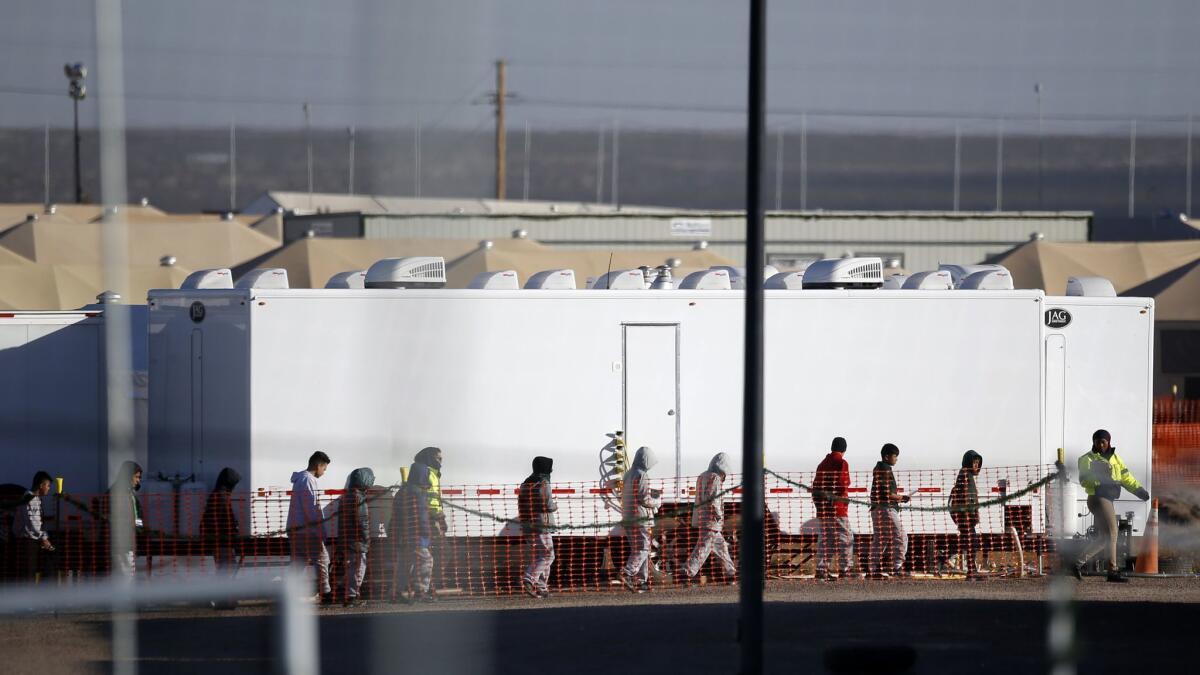Last migrant teens are moved from Texas ‘tent city’ in the desert

- Share via
Reporting from McAllen, Texas — The last child departed what was once the nation’s largest shelter for migrant youths on Friday, a “tent city” in the west Texas desert town of Tornillo that had spurred protests, official criticism and proposed legislation.
Workers have been dismantling parts of the massive temporary shelter east of El Paso for months, ever since the U.S. Department of Health and Human Services, the agency responsible for initially housing migrant youths, ended its contract with the nonprofit BCFS Health and Human Services.
On Friday, Republican U.S. Rep. Will Hurd, who pushed for the shelter’s closure, tweeted the news. “I just talked with the management at the Tornillo facility — the last kid just left,” he wrote. “This tent city should never have stood in the first place but it is welcome news that it will be gone.”
Tornillo had held more than 6,200 teens since it opened June 10, according to the Department of Health and Human Services.
Last summer, when immigrant family separations on the border spawned protests and outrage from lawmakers and celebrities, Tornillo became a rallying point, although officials said few of the migrant children separated from their parents were housed there. Still, a protest camp sprang up, and still remains.
Juan Ortiz has been protesting outside Tornillo since September, commuting from Tucson where he’s working on his doctorate in Mexican American studies at the University of Arizona. Ortiz, 44, an El Paso native, said that although the children had been moved, many shelter tents remained — and so would he until the shelter disappears.
From outside the facility Friday, he said he worried about the children who’d been moved, concerned that government officials “are just going to keep shuffling them from place to place.”
Victoria Palmer, a spokeswoman for the Health and Human Services Department, said that Tornillo would remain operational “through early 2019” but that no more migrant youths would be placed there. A spokeswoman for BCFS, formerly known as Baptist Child Family Services, referred questions to the U.S. agency.
After visiting Tornillo last month, Rep. Judy Chu (D-Monterey Park) and Sen. Jeff Merkley (D-Ore.) proposed legislation to close such massive emergency shelters, including a second facility in Homestead, Fla. They noted that the shelters are exempted from state childcare facility licensing requirements and that staff at Tornillo had not undergone FBI background checks.
“This makes children vulnerable to abuse, poses serious developmental challenges, and risks retraumatizing them,” Chu wrote in a statement. “Worst of all, this is a choice that was made by this administration. Unaccompanied children have been and can be released to loved ones or family who will look after their safety and well-being. Instead, Trump is fomenting xenophobia.”
The facility was criticized in a Health and Human Services inspector general’s report last year over the lack of required FBI fingerprint background checks. The Nov. 27 report also said the Tornillo facility did not employ enough clinicians to provide adequate mental health care for the children held there.
Youths held at Tornillo crossed the border unaccompanied by an adult, Palmer said. By law, they must be transferred from Border Patrol custody to a Health and Human Services shelter within 72 hours. From there, officials attempt to place them with a relative or other sponsor.
The process became delayed in April, when the department agreed to share fingerprints and other background check information they gather on would-be sponsors with Immigration and Customs Enforcement. Sponsors became reluctant to claim youths, and the number in federal custody grew from about 9,000 last spring when family separations began to 15,000 last month.
As a result, Tornillo was expanded in September and reached its peak last month, holding 2,800 youths. On Dec. 18, the Trump administration announced it was lifting the fingerprint requirement for adults living with a potential sponsor to speed the release of migrant children. The number of youths in custody has since dropped to 11,400.
Groups of youths from Tornillo could be seen at El Paso airport last week, traveling with shelter escorts and carrying matching black duffel bags. But it wasn’t clear how many were released and how many were transferred to other shelters.
In response to questions about how many were moved to other facilities, Lynn Johnson, assistant secretary of Health and Human Services’ Administration for Children and Families, said in a statement, “As of this weekend the last group of unaccompanied alien children will have been transferred or discharged … either released to an appropriate sponsor or transferred to other shelters throughout our network of care providers.
The federal government contracts to run 100 migrant youth shelters in 17 states with a total of 16,000 beds, and continues to expand.
The administration had to divert about half a billion dollars from other agency programs to cover added costs in the fiscal year that ended in September. That included the cost of operating Tornillo, at least $144 million between June and November, according to BCFS spokeswoman Krista Piferrer. She estimated it cost $775 a day to house a child in Tornillo.
Even as Tornillo was being dismantled Friday, federal officials were adding a thousand beds to the shelter in Homestead, Fla., bringing the total beds there to 2,350 — the largest in the nation. The center is 1,500 miles from the border, in a hurricane evacuation zone near the Everglades.
More to Read
Sign up for Essential California
The most important California stories and recommendations in your inbox every morning.
You may occasionally receive promotional content from the Los Angeles Times.











